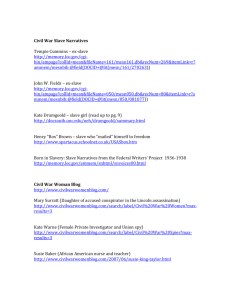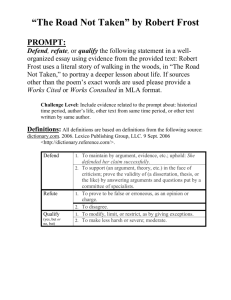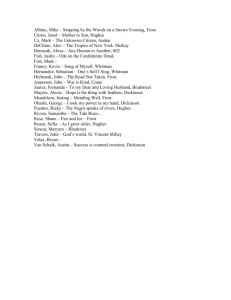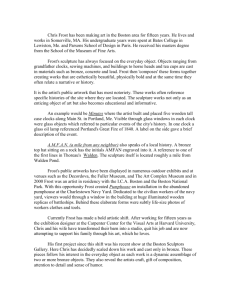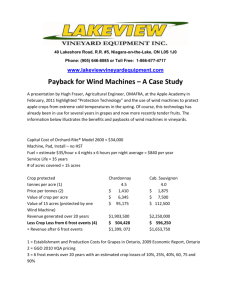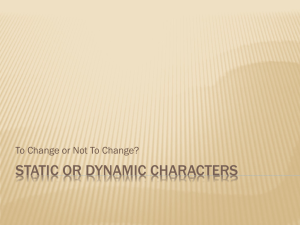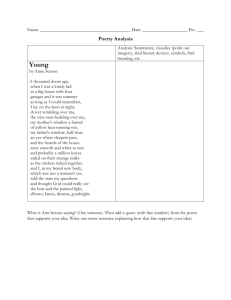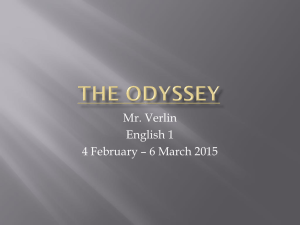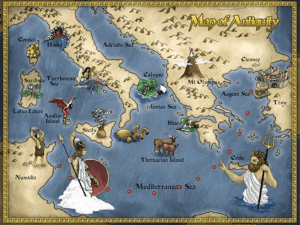Poems from Different Time Periods
advertisement
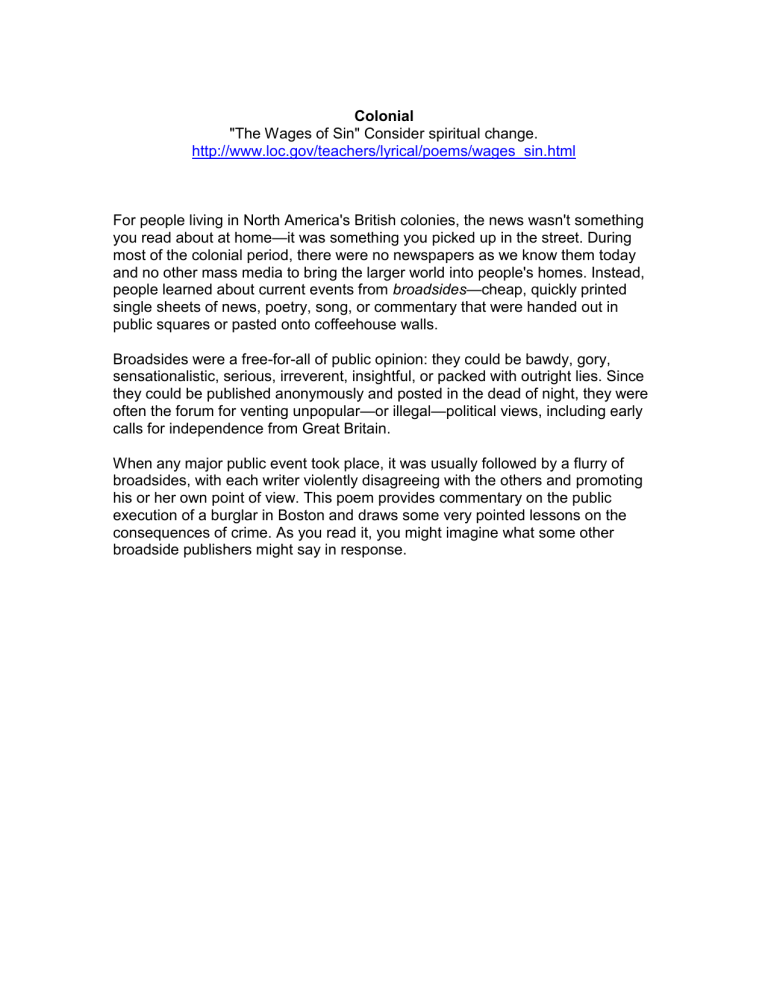
Colonial "The Wages of Sin" Consider spiritual change. http://www.loc.gov/teachers/lyrical/poems/wages_sin.html For people living in North America's British colonies, the news wasn't something you read about at home—it was something you picked up in the street. During most of the colonial period, there were no newspapers as we know them today and no other mass media to bring the larger world into people's homes. Instead, people learned about current events from broadsides—cheap, quickly printed single sheets of news, poetry, song, or commentary that were handed out in public squares or pasted onto coffeehouse walls. Broadsides were a free-for-all of public opinion: they could be bawdy, gory, sensationalistic, serious, irreverent, insightful, or packed with outright lies. Since they could be published anonymously and posted in the dead of night, they were often the forum for venting unpopular—or illegal—political views, including early calls for independence from Great Britain. When any major public event took place, it was usually followed by a flurry of broadsides, with each writer violently disagreeing with the others and promoting his or her own point of view. This poem provides commentary on the public execution of a burglar in Boston and draws some very pointed lessons on the consequences of crime. As you read it, you might imagine what some other broadside publishers might say in response. The Library of Congress Lyrical Legacy The Wages of Sin; OR, Robbery justly Rewarded: A POEM, Occasioned by the untimely Death of Richard Wilson, Who was Executed on Boston Neck, for Burglary, On Thursday the 19th of October, 1732. THis Day from Goal must Wilson be conveyed in a Cart, By Providence is strangely By Guards unto the brought Gallows-Tree, thus far to be reveal’d. to die as his Desert. By which we see apparantly, For being wicked there is no Places sure, overmuch, Where Workers of Iniquity there for a wicked Crime, can hide themselves secure. Must take his fatal Lot with There is no Man by human such Wit, as die before their Time. can keep his Sin conceal’d No human Pardon he can When he that made him get, thinks it fit by Intercession made; the same should be But flee he must unto the reveal’d. Pit, He that gets Wealth in and by no Man be stay’d. wicked Ways, The fatal sad and woful and slights the Righteous Case, Rule, this awful Sight reveals, Doth leave them here Of one whom Vengeance amidst his Days, in his Chase and dies at last a Fool. hath taken by the Heels. Here we may see what Men Here is a Caution in the for Stealth Sight, and Robbing must endure; to wicked Thieves, and they And what the Gain of ill Who break and rob the got Wealth House by Night, will in the End procure. which they have mark’d by Here is a Caution high and Day. low, We see the Fall of one that for Warning here you have, cast From one whose Feet are his Lot in by Decree, now brought to With those that wait the the Borders of the Grave. Twilight past, He does bewail his misthat so no Eye may see. spent Life, That wicked Action which and for his Sins doth grieve, he thought Which is an hopeful Sign by Night would be that he conceal’d, a Pardon will receive. He says, since he forsook his God, God has forsaken him, And left him to this wicked Crime, that has his Ruine been. He calls his Drunkenness a Sin, with his neglect of Prayer, The leading Crimes have brought him in to this untimely Snare. All you that practice cursed Theft, take Warning great and small, Lest you go on, and so are left to such untimely fall. Repent of all your Errors past, and eye the Stroke of Fate, Lest you thus come to Shame at last, and mourn when ’tis too late. Remember what the Scripture saith, a little honest Wealth, Is better far than mighty Store of Riches got by Stealth. This Warning foundeth in our Ear, this Sentence loud and Shrill, O Congregation, hear and fear, and do no more so ill. FINIS. there is no Places sure, x now brought to the Borders of the Grave. He does bewail his mis-spent Life, and for his Sins doth grieve, Which is an hopeful Sign that he a Pardon will receive. He says, since he forsook his God, God has forsaken him, And left him to this wicked Crime, that has his Ruine been. He calls his Drunkenness a Sin, with his neglect of Prayer, The leading Crimes have brought him in to this untimely Snare. All you that practice cursed Theft, take Warning great and small, Lest you go on, and so are left to such untimely fall. Repent of all your Errors past, and eye the Stroke of Fate, Lest you thus come to Shame at last, and mourn when ’tis too late. Remember what the Scripture saith, a little honest Wealth, Is better far than mighty Store Revolutionary Phyllis Wheatley on being brought from Africa (though it's fiercely accomodationist, it's definitely about change...) http://memory.loc.gov/cgibin/ampage?collId=ody_rbcmisc&fileName=ody/ody0215/ody0215page.db&recN um=19 Whitman poem (http://www.loc.gov/exhibits/treasures/trm013.html). Post-Rev through Civil War Abolition poems: http://memory.loc.gov/cgi- bin/ampage?collId=ody_musmisc&fileName=ody/ody0316/ody0316page.db&rec Num=7 http://memory.loc.gov/cgi- bin/ampage?collId=ody_musmisc&fileName=ody/ody0316/ody0316page.db&rec Num=9 Post WWII Robert Frost, the Gift Outright: http://www.loc.gov/exhibits/treasures/tri050.html Robert Frost wrote a new poem entitled "Dedication" for delivery at the inauguration of John F. Kennedy in 1961, but never read it, because the sun's glare upon the snow blinded Frost from seeing the text. Instead, he recited "The Gift Outright" from memory. The Library holds Frost's original, working draft of "Dedication" as well as this fair copy of the more familiar poem. Robert Frost served as the Library's consultant in poetry (1958-1959) and honorary consultant in the humanities (1958-1963). In addition, Frost recorded readings of his poetry at the Library in 1948, 1953, and 1959 for the Archive of Recorded Poetry and Literature. From the Poetry of Robert Frost, © 1970 by Lesley Frost Ballantine, © 1969 by Henry Holt and Company, Inc. Reprinted by permission of Henry Holt and Company, Inc. http://www.loc.gov/exhibits/treasures/images/uc005075.jpg Words Like Freedom There are words like Freedom Sweet and wonderful to say. On my heartstrings freedom sings All day everyday. There are words like Liberty That almost make me cry. If you had known what I know You would know why. -Langston Hughes
